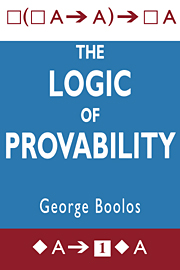Book contents
- Frontmatter
- Contents
- Preface
- Introduction
- 1 GL and other systems of propositional modal logic
- 2 Peano arithmetic
- 3 The box as Bew(x)
- 4 Semantics for GL and other modal logics
- 5 Completeness and decidability of GL and K, K4, T, B, S4, and S5
- 6 Canonical models
- 7 On GL
- 8 The fixed point theorem
- 9 The arithmetical completeness theorems for GL and GLS
- 10 Trees for GL
- 11 An incomplete system of modal logic
- 12 An S4-preserving proof-theoretical treatment of modality
- 13 Modal logic within set theory
- 14 Modal logic within analysis
- 15 The joint provability logic of consistency and ω-consistency
- 16 On GLB: The fixed point theorem, letterless sentences, and analysis
- 17 Quantified provability logic
- 18 Quantified provability logic with one one-place predicate letter
- Notes
- Bibliography
- Index
- Notation and symbols
6 - Canonical models
Published online by Cambridge University Press: 08 January 2010
- Frontmatter
- Contents
- Preface
- Introduction
- 1 GL and other systems of propositional modal logic
- 2 Peano arithmetic
- 3 The box as Bew(x)
- 4 Semantics for GL and other modal logics
- 5 Completeness and decidability of GL and K, K4, T, B, S4, and S5
- 6 Canonical models
- 7 On GL
- 8 The fixed point theorem
- 9 The arithmetical completeness theorems for GL and GLS
- 10 Trees for GL
- 11 An incomplete system of modal logic
- 12 An S4-preserving proof-theoretical treatment of modality
- 13 Modal logic within set theory
- 14 Modal logic within analysis
- 15 The joint provability logic of consistency and ω-consistency
- 16 On GLB: The fixed point theorem, letterless sentences, and analysis
- 17 Quantified provability logic
- 18 Quantified provability logic with one one-place predicate letter
- Notes
- Bibliography
- Index
- Notation and symbols
Summary
We shall now present a method for constructing modal-logical models. The method enables us to construct from each consistent normal system L of propositional modal logic a model ML, = 〈WL, RL, VL〉, called the canonical model for L, in which all and only the theorems of L are valid. Although canonical models are of great interest in the study of systems of modal logic other than GL, the canonical model for GL is not particularly useful for the study of GL itself. (Outside this chapter, the notion of a canonical model is used to prove only one theorem in this book, Theorem 3 of Chapter 13.)
We shall begin by defining the canonical model for a consistent normal system L and then prove a completeness theorem for each member of a quite large family of systems that includes K, K4, T, S4, B, and S5 – but not GL, alas.
Let L be a consistent system of normal modal propositional logic. Thus L⊬⊥.
A set X of arbitrary modal sentences is called (L-) consistent iff for no finite subset Y of X, L⊢¬ ∧ Y. If X is consistent, at most one of A and ¬A belongs to X; otherwise, evidently, L⊢¬(A ∧ ¬A), and X is not consistent.
Lemma 1.If S is consistent, then either S∪{A} is consistent or S∪{¬A} is consistent.
Information
- Type
- Chapter
- Information
- The Logic of Provability , pp. 85 - 91Publisher: Cambridge University PressPrint publication year: 1994
